#decommunisation
Text
Decommunisation: Freeing Ukraine from Soviet legacy
Decommunisation in Ukraine is an important transformative process aimed at the separation of contemporary Ukrainian identity from the Soviet legacy and Communist past. This process involves several as Source : www.weareukraine.info/decommuni…
0 notes
Text
EU adopts Ukrainian art exhibition left stranded in Denmark | Ukraine | The Guardian
A Ukrainian exhibition that was left stranded in a gallery in Denmark unable to return to Kyiv when Russia invaded has reopened in Brussels after being adopted by the EU.
The Unfolding Landscapes show, which includes paintings, sculptures, installations, drawings, photography and video, could not return to Ukraine and risked being locked away when its Danish run ended.
A solution was found during four weeks of frenetic negotiations between curators, officials in the EU’s foreign policy wing, the European external action service, and the Art and History Museum in Brussels.
Made and curated by 42 Ukrainian artists before Vladimir Putin’s February invasion, the show includes works that give a sense of foreboding. It will now stay in the Belgian capital’s premier art museum until 18 September, after which there are tentative plans for it to move to Switzerland.
EU officials are looking at circulating the exhibition around some of the 27 member states until the pieces may safely return home, in what officials and curators said would be a highly symbolic moment.
At the exhibition’s opening on Tuesday, Ukraine’s ambassador to the EU, Vsevolod Chentsov, said that in adopting the exhibition the EU had “brought this new spirit of quick effective decisions into the art world”, in a nod to the bloc’s speedy imposition of economic sanctions on Russia.
“I hope this project has a big European future,” he said. “It starts in Belgium in Brussels in the heart of the EU, and I know that there are ideas about how it can continue and I hope, I’m sure, we will be able to do it.”
Many of the artists whose works are showcased are involved in the Ukrainian war effort in cities such as Kharkiv close to the frontline in the north-east of the country, according to the curator Natalia Matsenko, who travelled from Kyiv for the Belgian opening.
“I don’t know if any of the artists are fighting but I know some have the intention to do so,” she said. “This is a war and the whole nation is involved. It is not the military over there but the whole country is volunteering now.”
The Ukrainian-Danish artist Sergei Sviatchenko, a celebrated part of the Ukrainian new wave art movement that emerged at the time of the collapse of the USSR, was a key figure in the organisation of the original exhibition in the Silkeborg Bad Art Center in Denmark, which ran until May.
Sviatchenko, 70, said that when it became clear that the original plan for the works to return to Kyiv was impractical he had the idea that it could travel around Europe in a continuation of what he described as his life’s work of “cultural diplomacy”. “Perhaps it can also go to London. That would be special, I think,” Sviatchenko said.
Sign up to First Edition, our free daily newsletter – every weekday morning at 7am BST
Most of the artists showcased are of a younger generation, born since the early 1980s as citizens of the USSR, who were teenagers when Ukraine declared itself an independent country in 1991.
They are said in the exhibition’s brochure to have had first-hand experience of the 2014 Revolution of Dignity, which condemned the totalitarian Communist and Nazi regimes, and began the decommunisation of modern Ukraine. The 2014 revolution brought the ousting of the then pro-Russian president Viktor Yanukovych.
One video on show by Yuri Yefanov, an artist who was born in Zaporizhzhia near today’s front-line, was filmed in 2013 on a beach on the southern coast of Crimea, where the artist grew up. Its focus is a concrete cube that was once part of the coastal defences. Today the area is impossible to visit as it is the site of a Russian military academy. Russia invaded and occupied Crimea in 2014.
This content was originally published here.
0 notes
Text
”Ukraine’s parliament has voted through two laws that will place severe restrictions on Russian books and music as Kyiv seeks to break many remaining cultural ties between the two countries following Moscow’s invasion.
One law will forbid the printing of books by Russian citizens, unless they renounce their Russian passport and take Ukrainian citizenship. The ban will only apply to those who held Russian citizenship after the 1991 collapse of Soviet rule.
It will also ban the commercial import of books printed in Russia, Belarus and occupied Ukrainian territory, while also requiring special permission for the import of books in Russian from any other country.
Another law will prohibit the playing of music by post-1991 Russian citizens on media and on public transport, while also increasing quotas on Ukrainian-language speech and music content in TV and radio broadcasts.
The laws need to be signed by president Volodymyr Zelenskiy to take effect, and there is no indication that he opposes either. Both received broad support from across the chamber on Sunday, including from lawmakers who had traditionally been viewed as pro-Kremlin by most of Ukraine’s media and civil society.
Ukraine’s culture minister, Oleksandr Tkachenko, said he was “glad to welcome” the new restrictions.
“The laws are designed to help Ukrainian authors share quality content with the widest possible audience, which after the Russian invasion do not accept any Russian creative product on a physical level,” the Ukrainian cabinet’s website quoted him as saying.
The new rules are the latest chapter in Ukraine’s long path to shedding the legacy of hundreds of years of rule by Moscow.
Ukraine says this process, previously referred to as “decommunisation” but now more often called “derussification”, is necessary to undo centuries of policies aimed at crushing Ukrainian identity.
Moscow disagrees, saying Kyiv’s policies to entrench the Ukrainian language in day-to-day life oppress Ukraine’s large number of Russian speakers, whose rights it claims to be upholding in what it calls its “special military operation”.
This process gained momentum after Russia’s 2014 invasion of Crimea and support for separatist proxies in Ukraine’s Donbas, but took on new dimensions after the start of the full-scale invasion on 24 February.
Hundreds of locations in Ukraine’s capital, Kyiv, have already been earmarked for renaming to shed their associations with Russia, and a Soviet-era monument celebrating the friendship of the Ukrainian and Russian people was torn down in April, eliciting cheers from the assembled crowd.”
- Luke Harding, Reuters in Kyiv, “Ukraine restricts Russian books and music in latest step of ‘derussification’,” The Guardian. June 20, 2022.
////
Oleksandra Koval, director of the Ukrainian Book Institute (part of the Ukrainian Ministry of Culture), has claimed that they will begin working towards withdrawing over 100 million so-called ‘propaganda’ books from public libraries in Ukraine. The books – including the works of the world-renowned writers and poets Dostoyevsky and Pushkin – may be sent to paper recycling centres according to the Minister of Culture and Information Policy, Oleksandr Tkachenko.
The first round of withdrawals, which Koval expressed a desire to complete by the end of the year, will target what she called in an interview with Interfax Ukraine, “ideologically harmful literature” published when Ukraine was a part of the Soviet Union, as well as Russian literature with so-called “anti-Ukrainian content”. The second round of withdrawals is intended to include all books published in Russia since the collapse of the Soviet Union: “they will probably be of different genres, too, including children’s books, and romance novels, and detective stories,” Koval explained.
After the disposal of such ‘harmful’ literature, Ukrainian Public and School libraries will be left with about 100 million books, or half of their current total volume, according to Koval’s estimate. But not all copies of Russian books ought to be removed, says Koval: some should be kept in university and scientific libraries, where Soviet-era children’s fairy tales and romance novels will be preserved “for specialists to study the roots of evil and totalitarianism”.
The removal of Russian books must be seen in the greater context of the ‘decommunisation’ of Ukraine. Since 2015, all communist parties and symbols have been banned, and the war has only been used to further ramp up political repression: the Zelensky regime has banned another eleven parties, and has placed all TV stations under government control.
This is not the first time in recent years Russian books have been banned by the Ukrainian government. In 2015, 38 books published in Russia were banned. More books have been added to the list since, including two books by the popular contemporary Russian detective-novel author, Boris Akunin, and a memoire of the beloved Soviet actor and musician Vladimir Vysotsky.
In 2018, the Russian language edition of ‘Stalingrad’ by British historian Antony Beevor was banned, although the ban was later lifted due to pressures from the British embassy. The reason for the ban? A passage describing the murder of 90 Jewish children by the Organisation of Ukrainian Nationalists, of which Nazi collaborator Stepan Bandera was a leading figure.
In 2018 a Russian language book describing the murder of 90 Jewish children by Nazi collaborator Stepan Bandera was banned / Image: Picasa Gallery, Wikimedia Commons
This is the same Bandera who in 2021 was honoured by the Ukrainian Institute of National Memory through inclusion in a ‘Virtual Necropolis’ commemorating important historical figures – alongside two commanders of SS battalions (Smovsky Konstantin Avdiyovych, deputy commander of the 118th Battalion of the Schutzmannschaft and Ivan Omelianovycha-Pavlenko, commander of the 109th Schutzmannschaft) who carried out pogroms against Jews! But monuments to Stepan Bandera are not limited to the virtual realm. In recent years statues have been constructed in honour of the pogromist, while statues of Lenin and Pushkin have been torn down. And in Chernihiv, a monument to the Soviet partisan and anti-fascist martyr Zoya Kosmodemyanskaya was demolished.
On 21 May, a picture was shared on social media allegedly showing the burning of Ukrainian history books, organised by Russian forces. This image was given wide circulation by the British ambassador to Ukraine, as well as the ex-prime minister of Sweden, Carl Bildt (who, among other shady dealings, has been implicated in war crimes in Sudan as a member of Lundin Group’s board of directors).
The picture was later proven by the France24 fact checking site ‘the Observers’ to have been taken during a protest in Crimea in 2010. Regarding whether the Russian forces have generally engaged in the destruction of books, the France24 article goes on to say that “Ukrainian authorities have claimed that Russian soldiers have destroyed books in the occupied areas… However, our editorial staff did not find any photos showing this destruction.”
It is hardly novel for governments to crack down on free speech in times of war. But this attack is just the latest of many attacks against the status of the Russian language in Ukraine that long precede this war. One third of Ukrainians regard Russian as their native tongue. Yet in 2017, a law was tabled stating that Ukrainian must be the language used at all levels of education, with Russian and other minority languages only recognised for instruction at pre-school and primary school levels. Before his election in 2019, Zelensky had promised to throw this law out but soon reneged on his promises. This is just a continuation of the chauvinist policies of Ukrainian governments since the 2014 Maidan coup, which have repeatedly clamped down on the democratic rights of Russian speakers, whilst glorifying historical Nazis and Nazi collaborators, and permitting fascist gangs free reign across the country for years.”
- Jonathan Söderberg, “Ukraine: 100 million Russian books in line for ban,” In Defence of Marxism. 06 June 2022
#russia-ukraine war 2022#ukrainian politics#ukrainian nationalism#reactionary politics#book banning#banned books#russian language#language politics#russian invasion of ukraine
0 notes
Text
[訳出] “レフト・イーストはウクライナに対するプーチンの帝国主義的戦争を糾弾する”
ここで紹介するのは、現代の中東欧左翼グループによる、今般のウクライナへのロシアの侵略・攻撃に対するステートメントです。
“LeftEast Condemns Putin’s Imperial War Against Ukraine”
LeftEast、以下レフト・イーストは、ポスト社会主義の時代における左翼のあり方を巡って思想を研さんしていくことを目指す、中東欧のジャーナリストや学者、あるいは中東欧に関心を寄せる西ヨーロッパの同様のひとたちからなる有機的ネットワークです。比較的若い、現在20〜40代くらいの層が中心となっています。
ソ連時代・社会主義時代の誤った政策により歪められてしまった社会主義・共産主義の思想を、(おもに19世紀以降の社会思想を頼りに)中東欧地域の歴史的・文化的文脈の中で再構成し、現代のグローバル資本主義に対抗するためのプラットフォームを立ち上げています。
友人からこの記事について教えてもらいました。自分とはやや立場の異なる思想だというのは事実です。但し、内容については、一部NATOに関する指摘などを除き同意しています。全体として十分に論理的で、共感もできますが、今のウクライナの戦禍で苦しむ一般の人たちにこうした言葉はあまりに空虚に映る気もします。(これを書いている人たち自身がまさにグローバルな情報ネットワークに生かされてもいるわけで)知的エリート特有のバランス感覚に頼り過ぎている側面もあると思います。しかし、今回の問題を考える上で、このステートメントを読むことには有益な点もあると考えます。また、ウクライナのメディア関係も編集班にいるため、総合的なものではありませんが、一部のウクライナの声を反映するものともなっていますし、様々な不平等に対し網羅的な視点を提示している点も重要なのではないかと考えます。
(この訳出によって、反米を反ロシアに対置させて喧嘩両成敗とする意見を助長したり、支持する意図は全くありません。また、この十分に注意して選ばれたであろう語彙の表明しているイデオロギー的な態度について、無条件に称賛するような意図もありません。軍事侵攻とその決定を下したロシア、プーチン政権に重大な責任があるということについては、この論考も第一義的に認めています。)
ウクライナを含め、ポスト社会主義諸国が抱えてきたジレンマ(古い冷戦構造に影響を受けた政治構造の温存と90年代以降彼らが受け入れねばならなかったグローバル資本主義下の社会構造のラディカルな変化)がいかに今回の侵略を呼び込んだのか。独立を果した一方で、最初から全くの自由ではない、ある種押しつけられた選択に迫られ、振り回されてきた地域の現実。『脱共産化』によって、地域が育んできた社会的な思想の意義が削ぎ落とされ、根絶やしにされていくこと、それにより多様性が現じられることへの懸念。
中東欧の現実は、地域的な文脈においてまさに理解されるべきであり、そうしない限り、大国の関心を反映させた解釈を繰り返し、我々自身の偏見を強めていくことになるのではないでしょうか。そして、連帯した同地域の語彙を用いて、その語りを引き受けることで、我々自身がこの問題とより具体的な接点をもつことができるとも言えるかもしれません。こうしたより冷静かつ包括的な見方を組み立てる上でも、『脱共産化』をどう分析し解体していくかという問題は、しっかりと引き継ぐべき点です。これは、ステートメントで強調されているように、ウクライナだけでなく、東欧地域が総じて火種として内包している大きな問題です。
(北海道のスラブ・ユーラシア研究センターの出版物の中に、英語ですが、今回の対立のエスカレーションにもつながるウクライナの脱共産化とメモリー・ポリティクス(記憶の政治)に関する論考が公開されています。)
訳出は以下の通りです。下のリンクには画像もありますので、気になった方はぜひ確認してください(画像に添えられたキャプションは訳出していません)。
*****
レフト・イースト編集部員の共同体は、ウクライナでの戦争へとエスカレートしていった暴力的で軍事的な攻撃に衝撃を受けている。何十年にもわたって経験してこなかったスケールの流血事態へと我々の地域が投げ込まれる恐れがある。我々は明白に、クレムリンの犯罪的な侵略を糾弾し、国際的国境の外へのロシア軍撤退を要求する。アメリカ合衆国、北大西洋条約機構[NATO]、そしてその同盟国がこの戦争をもたらしたのだという責任を忘れないようにしつつも、目下の状況における侵略者は、ロシアの政治経済的エリートである。我々の努力は、ロシアの説明不可能なウクライナへの帝国主義的侵略を白日の元に晒すべく行われる。これは、NATOによる威嚇的な拡大とウクライナのマイダン革命後の体制がその道を敷いたところのものである。革命的精神、そしてウクライナ、ロシア、地域の人々との連帯において、我々は今モスクワに「否!」と言い、今後の、モスクワかNATOかという誤った選択にも「否!」と言う。我々は即座に停戦し協議の場に戻ることを要求する。グローバル資本および軍事機械の関心には、一滴の人民の血も注がれるべきでない。平和、土地、パン!
オリガルヒらによる資本主義、権威主義的ネオリベラリズム、そして地域のグローバルな反共産主義勢力により醸成された中東欧地域の反共産主義を、我々は拒絶する。プーチン自身がその[2022年]2月21日の「歴史スピーチ」で脅したように、「[ウクライナは自分たちの]脱共産��を望むのか?そうなら、それでも私たちは構わない。でもそれは、彼らの言うように、道半ばで止める必要はない。ウクライナには、真の脱共産化が何を意味するのか、我々が見せてやろうじゃないか。」クレムリンによる今日の攻撃は、脱共産化が徹底されつつあることを表している。右翼政治家たちの少数がこれに利益を得ることは確実だが、しかし、我々のほとんどにとって、上述のナショナリズムと極右イデオロギーがもたらしうるのは、苦しい経験と、憎しみの旋回する連鎖に他ならない。経済的には、この反共産主義はオリガルヒによる資本主義−−そして貧困−−を、我々にもたらしてきた。ロシア、ウクライナ、そして東欧全体に見られるものである。政治的には、反共産主義は、その構成員たちを表象しようともするそぶりさえ見せないような政治権力を、我々にもたらしてきた。
我々は以下のとおり述べる。
(1)我々は、戦争のこの直接的な原因となる行動の責任をクレムリンに置く。ロシアという国家は、反動的な帝国主義的郷愁に過ぎないものを名目とし、また、過去そして現在の東欧の革命運動により例示される国際的な連帯に対する明白な謀反において、ウクライナを侵犯した。プーチンの「偉大なるロシア」というナショナリズムは、東欧の豊かな文化的多様性を否定することで国際的な地位を打ち立てようとする、犯罪的かつ無駄な試みである。我々は、この地域のすべての民族的共同体と協働し、すべてのひとにとってのより良き世界のための闘争を通じた、平和的な連帯というビジョンを堅持する。
(2)この戦争の首謀者および今日の中心的な侵略者はクレムリンだと考えるが、我々は、米国、そしてその多くの同盟国、そして超国家的な資本を、このおぞましい状況に対して責任をもつものだいうことを考慮する。彼らが、NATO拡大の懸念についてロシアと協議することを拒んだことが、自体の鎮静を求める、ウクライナ政府をはじめとする多くの要請に反して、戦火を焚きつけた。パンデミックのさなか、米国とその他の先進的な資本主義国家の経済的・政治的エリートは、民主的な正統性に対する自分たちの失敗や、欧州・大西洋の「統合」という経済的ヘゲモニーから人々の目をそらすことを望んだ。彼らは、まさに東欧の人々のあらゆる犠牲のもとに、資本蓄積の加速を後押しした。戦争に飢えた敵対者たちや昨今の帝国主義者プーチンは、おぞましいポスト社会主義の、そしてパンデミック関連の、ロシアやウクライナで同様に起こっている社会的再生産の危機を用いて、ナショナリスト感情を先導し、古い民族ナショナリストの対立から利益を得て、(再)生産しようとした。搾取的かつ拡大主義的な欧州・大西洋「統合」は今や、権威主義の口実となり、それは実際にウクライナにおいて全土を吹き飛ばすような戦争となっている。
(3)我々は、地域における反共産主義を拒絶する。それは、皮肉にもプーチンと、彼の「脱共産化」の約束とによって体現されたもので、彼の政権がロシアの左派野党、反ファシズム主義者、アナーキスト、そして反戦運動を周縁に追いやり、暴力的に鎮圧してきた一方で、プーチンを「コミュニスト」と見なす左翼の一部やあらゆるリベラル派の投影からプーチンが得てきた、羊の皮をかぶった狼の連帯にもかかわらず、そうするのである。しかしまた、そして重要なのは、ロシア、ウクライナ、そして東欧の卑しい日和見主義的な体制において、ナショナリズムや極右イデオロギーが養生されてきたような、寡頭制的な資本主義を基盤とする反社会的な体制を、我々が拒絶することである。こうした体制は、軍事主義的右翼のレトリックを組み合わせ、他者の不���から利益を得てきたのである。
(4)我々は、ここ数年のロシアとウクライナ双方における、いわゆるところの「脱共産化法とその改革」を拒絶する。ロシアと米国/NATOという二つの「敵陣営」は、権威主義的、反共産主義ネオリベラリズムの道を辿ってきた、帝国主義・資本主義勢力である。ウクライナもまたその上を歩んできたこの共有された道は、まずもってして、ネオリベラルな労働法、土地へのアクセスを防ぐことを意図した土地「改革」、小作農の所有の無効化、そして近年の経済・社会政策改革によって証明されてきた。こうした要因は、人々を搾取や貧困のリスクに著しく曝し、結果としてロシアとウクライナ、そしてそれらの国だけでない場所に、予期しなかった社会経済的危機を引き起こした。なぜなら、それは地域的な経済的なインパ���トをもつからである。
(5)ウクライナ政府をまったく民主的な自由の保持者とする昨今の称賛とは逆に、我々はウクライナのポスト・マイダン革命体制を疑問視する。体制による左派と野党への抑圧、主要野党政党の締め出し、大衆向け野党系メディアの遮断。差別的な言語政策やウクライナの政治、民族、文化的多様性の認識と容認への希望の全くの欠損、そして、過去七年間にわたるミンスク合意履行のサボタージュ。ウクライナの極端な「脱共産化」改革はまた、我々が単純に、昨日までの持続不可能な状況へと立ち戻るのを望めないことを明らかにしている。
(6)我々は、陣営主義的な解決策を拒絶する。こうした解決策は、ラディカルな社会変革、民主主義、労働者の力、インクルーシブネス、そして開放への真正なる闘争を支持するかわりに、レイシストかつ軍事主義の欧州・大西洋の統一に救いや、あるいは解放主義的なユーラシアニズムに救いを見出そうとするものだ。
(7)流血、貧困、そして分断しか想起させない反動的なイデオロギーを前にして、我々は、東欧における革命運動の遺産を堅持する。これらの運動の(多くの)伝統において、我々は決定的に、資本主義、帝国主義、軍事主義に反対する闘争と、宗教、民族、ジェンダーの平等とを追求する。労働者および我々の地域において抑圧されてきた人々の連帯におけるこの闘争は、民族的ウクライナ人とロシア人の、そしてまた歴史的に同地域において抑圧されてきた集団ーーロマ人、ユダヤ人、タタール人、そして移民コミュニティ、女性、セクシャル・マイノリティーーのより良き未来への唯一の希望である。この精神のもと、我々はウクライナとロシアにおける政治収容犯への連帯と、両国におけるラディカルな反資本主義民主主義およびその勢力への支援を宣言する。
我々は、即時の停戦、経済・政治的なエリートに影響は与えるも当該の国の労働者や人民には影響を与えない反戦努力、そして和平プロセスや地域を戦争に巻き込んだ社会・経済政策における過去の誤りを棚卸しする交渉を要求する。我々は、ウクライナとロシアの反資本主義・反戦運動との連帯のもとにある。我々は、リベラルデモクラシーの約束には幻想を抱かない。階級闘争以外の争いは不要である!
我々は、戦争によってまだ影響を被っていない国々の同志に対し、十全かつ人道的なウクライナおよび全ての紛争地帯からの難民の受け入れについて政府にプレッシャーをかけ、平和への支給の道筋を示すことを要求し、攻撃と武力行使によって影響を受けた人々の生活への連帯を表明するよう求めたい。我々のもとには、導きとなる左翼インターナショナリズムと平和主義の歴史とがある。
6 notes
·
View notes
Photo
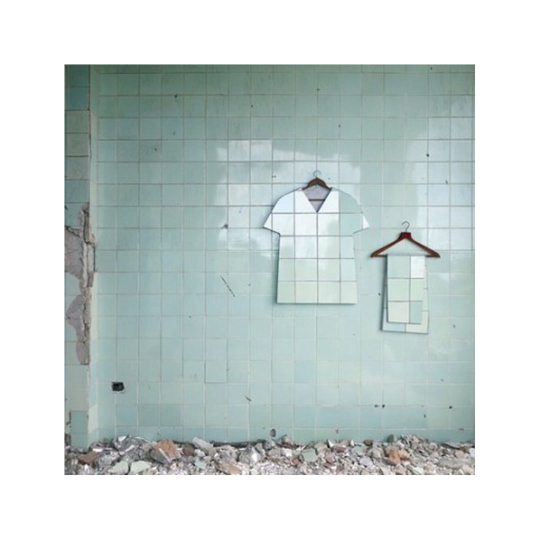
Second Hand Since 2014, Ukrainian artist Zhanna Kadyrova has been exploring the relationship between architecture and mosaic. Carried out in different places and dubbed ‘Second Hand’ the project responds to the architectural and social memory of particular communities. Ukraine, Kadyrova’s home country, has a long history of ceramic tile production and in previous iterations she has used tiles from defunct soviet-era industrial buildings, memorialising these structures in sculptures reminiscent of 1960s and 1970s-style soviet fashion. Kadyrova began this project shortly before Ukraine introduced decommunisation, a process intended to erase all trace of the country’s soviet past. Due to their material - smalt, mosaic panels or ceramic tiles feature a strong physical resistance to the effects of time, being more durable than the architecture they are set upon. The ‘Second Hand’ project began in Sao Paulo in 2014 when Kadyrova found tiles in second hand shops, produced approximately in the 1970s. A year later, she did it in her home country, where she used old tiles found in the lining of the ‘Darnitski Silk Factory’ premises or stored on its territory. The project continued in Chernobyl in 2017, where she made a dress for a mannequin from the ceramic tiles that decorated a bus station. Before the ‘Venice Art Biennale 2019’ the artist went to the ‘Kiev Film Copy Factory’ and repurposed the tiles. #neonurchin #neonurchinblog #dedicatedtothethingswelove #suzyurchin #ollyurchin #art #music #photography #fashion #film #design #words #pictures #ukrain #decommunisation #ceramictiles #smalt #darnitskisilkfactory #kievfilmcopyfactory #reimagine #reuse #tileclothes #eclecticclothing #secondhand #zhannakadyrova (at Kiev, Ukraine) https://www.instagram.com/p/CYi5D38oh01/?utm_medium=tumblr
#neonurchin#neonurchinblog#dedicatedtothethingswelove#suzyurchin#ollyurchin#art#music#photography#fashion#film#design#words#pictures#ukrain#decommunisation#ceramictiles#smalt#darnitskisilkfactory#kievfilmcopyfactory#reimagine#reuse#tileclothes#eclecticclothing#secondhand#zhannakadyrova
0 notes
Photo

struggle over historical concepts
#Europe#Ukraine#Kiev#Soviet monument#Socialist monument#Socialist art#Soviet art#decommunisation#decommunization
1 note
·
View note
Photo
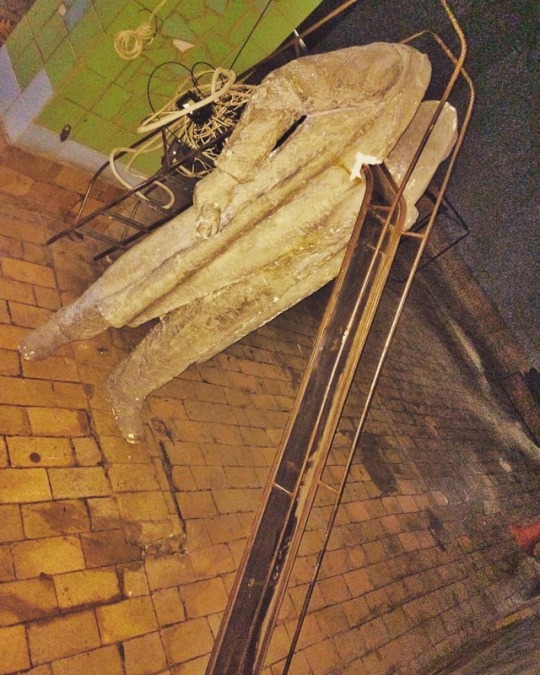
Памятник человеку, который умер, потому что вы ездили ему по мозгам. #kyiv #ukraine #decommunisation (Plivka)
2 notes
·
View notes
Photo
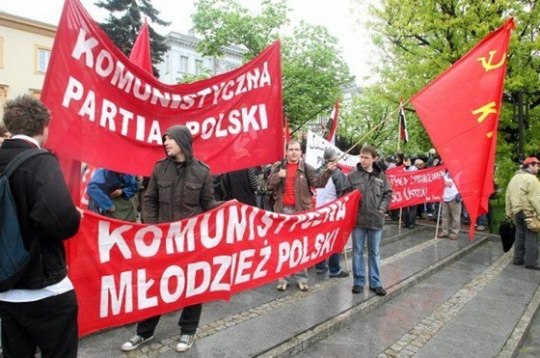
Communist Party of Poland: Against the destruction of historical memory
We condemn the changes of street names around Poland driven by the government, and the increasing number of devastations and liquidations of monuments commemorating heroes of struggle against fascism. Recent example is the dismantling of the Mausoleum of the Red Army in Trzcianka. Changing names of the streets and attacks on monuments of Soviet and Polish soldiers, communist partisans and militants of the workers’ movement are a result of the historical policy imposed by the state authorities. It is being implemented by the Institute of National Remembrance (IPN) which is questioning even liberation of Poland in 1944–1945.
We oppose the ‘Decommunisation Act’ that imposes changes of the street names and other public objects and liquidation of monuments and memorials regarded as promoting communism. In many places, during public consultations, inhabitants nearly unanimously voiced against changing toponyms of the streets. Due to this resistance many local authorities resigned from conducting decommunisation.
The ‘Decommunisation Act’ and the way it’s being implemented show that opinion of the society is meaningless for the authorities. In frames of this act, the voivodes – local representatives of the central government – gain power to impose new toponyms where local authorities failed to change them. It is an illegal interference in competence of the local authorities, so the appeals against these decisions should be addressed to administrative courts. What’s more, the costs and consequences of these changes will be covered by inhabitants, even those who opposed them.
The main object of the attack are the patrons who participated in the struggle against fascism, they constitute 2/3 of the list of patrons to be changed, composed by the IPN. Historical policy conducted by the authorities leads to replacing these patrons with anticommunists promoted by the IPN. Equating communism with fascism is an element of this policy, and this indirectly leads to whitewashing the later. It also promotes nationalism. The aim of this policy is not only to shape the vision of the history, but also aggressive anticommunist positions, mostly among the youth.
In this situation, the resistance against falsifying of the history is needed. The most efficient way to oppose the ‘Decommunisation Act’ is a broad social resistance. In many cities, there are campaigns to preserve names of the streets and monuments. Communist Party of Poland expresses its support for these activities of the local groups and calls upon all its members and sympathisers to participate in this resistance.
#Poland#communist#monuments#decommunisation#counter-revolution#fascism#antifa#Red Army#Soviet#World War II#liberation
8 notes
·
View notes
Text
can’t believe I have to make this post but here we go
Dear followers and mutuals! if you, no matter of your political alignment, support the next arguments:
support of the annexation of Crimea and legitimacy of DPR/LPR or claim that elections there were legitimate
believe claims that Ukrainian government/military is backed up by nazis or our government is a US’ puppet, etc
If you believe a neo-nazi problem in Ukraine is somehow special or worse than literally anywhere else
think that decommunisation in Ukraine is bad
believe that there’s a genocide/racism against Russians going on in ukraine
If you believe people in the occupied territories of Crime and Donbas would prefer to join Russia
THEN UNFOLLOW ME RIGHT NOW
I’d like people to hear me out that as a born and raised Ukrainian I am uncomfortable with you following me if those are your beliefs. I am not here to argue since I have worse shit to care about. It isn’t my job to educate anyone but I wish people who believe the arguments from above wondered sometimes why do they support the arguments that kremlin has been propagating for the past 8 years. Listen to Ukrainians.
#I have to pin this shit because instead of my cat drawings wth I hate life#I can’t tell you how much actual Ukrainian voices are suppressed when westerners talk about this shit
36 notes
·
View notes
Text
"This is Putin's war"
Really?
While concerned westerners are having heated debates whether Azov batallion or Right Sector movement are real nazis, let me show you what it looks like in the town of Bucha, recently liberated from russian occupants.
Dozens of civillians laying on the road, killed. Body parts, whole bodies. Some have their arms tied behind their back.
"This is Putin's war"
Really?
Did Putin kill all these civilians, children, raped women, terrorised cities and villages with indiscriminate bombing???
THIS IS NOT A WAR. THIS IS GENOCIDE.
YET ANOTHER GENOCIDE OF UKRAINIANS.
ON OUR LAND.
IN OUR HOMES.
https://www.youtube.com/watch?v=VXyQFusOjDg
Fuck Russia.
There's going to be no peace in the world as long as this mordor exists.
No peace deal with bloody war criminals, only destruction of Russia.
Demilitarization. Deputinization. Decommunisation. And technical government like in Germany after WWII.
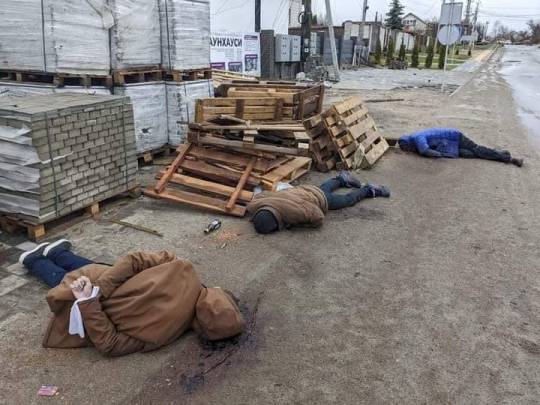
#ukraine#russia#russia ukraine war#war#stop putin#stop russia#stand with ukraine#stoprussia#russian culture#not all russians
6 notes
·
View notes
Photo
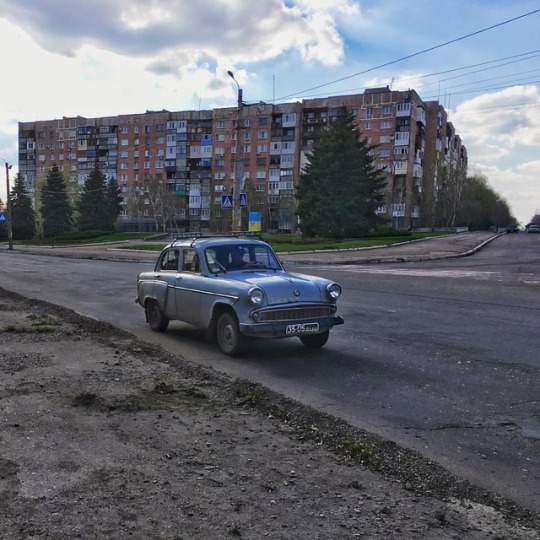
Toretsk, Donetsk region. 2017. photo by @toretsk_city
#toretsk#дзержинск#индустриальныйрай#decommunised#industrialheaven#donbass#донбасс#торецк#dzerzhinsk
14 notes
·
View notes
Photo
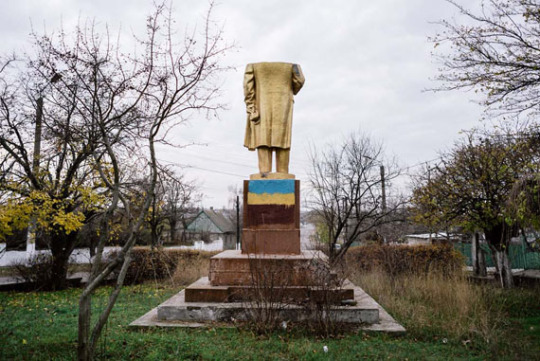
Niels Ackermann, Shabo, Odessa region. 21 November 2015
In December 2013 Niels Ackermann witnessed the Lenin monument being demolished on the Bessarabia square in Kiev, after the government launched an official, reinforced by presidential decrees, decommunisation process. By 2015 there were five times less Ilyiches in the country, and today there is not a single one left.
10 notes
·
View notes
Photo
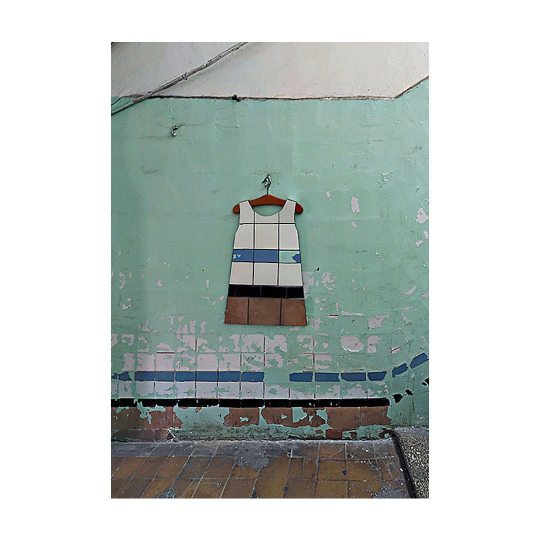
Second Hand Re-use, redistribute, repurpose, rethink, reclassify, regenerate, recycle, reclaim. It’s essentially what we do when we take a building and restore or reimagine it. It’s what we do when we re-use clothing items that once belonged to another. Ukrainian artist Zhanna Kadyrova employs a bit of ‘Column A’ and a bit of ‘Column B’. There’s a slightly unnerving quality about her work. Stiff tiled shirts hang formally on wooden coat hangers, their tiled fabric unyielding and unapologetic. They hang silently echoing the materiality of the walls behind them, tied as they are to the architectural past their very fabric is made from. ‘Second Hand’ is the project Kadyrova started in San Paulo in 2014 inspired by the widespread practice of tiling coloured walls in Brazil. Here she purchased second hand, decorative tiles used to cover Brazil’s local shops, cafés and buildings, creating with them her signature eclectic clothing art pieces. #neonurchin #neonurchinblog #dedicatedtothethingswelove #suzyurchin #ollyurchin #art #music #photography #fashion #film #design #words #pictures #ukrain #decommunisation #ceramictiles #smalt #darnitskisilkfactory #kievfilmcopyfactory #reimagine #reuse #tileclothes #eclecticclothing #secondhand #zhannakadyrova (at Kiev, Ukraine) https://www.instagram.com/p/CYi4-a9Itb4/?utm_medium=tumblr
#neonurchin#neonurchinblog#dedicatedtothethingswelove#suzyurchin#ollyurchin#art#music#photography#fashion#film#design#words#pictures#ukrain#decommunisation#ceramictiles#smalt#darnitskisilkfactory#kievfilmcopyfactory#reimagine#reuse#tileclothes#eclecticclothing#secondhand#zhannakadyrova
0 notes
Text
Le PS n'a définitivement plus rien à raconter | Slate.fr
En Europe, en France, la disparition du parti socialiste a une explication historique, elle s'inscrit dans l'inadaptation de l'analyse historique incomplète du monde selon K. Marx et F. Engels, et donc leur théorie de combat incomplète aussi.
L'anti-communisme primaire et primale de la guerre froide a fait plusieurs victimes, le parti communiste, le parti socialiste et par ricochet les républicains faute d'alternance crédible.
Les bourreaux sont les républicains américains et l'aristocratie britannique comme essentiel représentant d'un capitalisme à l'offensive.
Aujourd'hui, avec la crise ukrainienne, après la decommunisation on constate une derussification par amalgame, conséquence un Russia bashing ethnique en occident européen.
Ainsi dans une réplique quasi-sismique de la glaciation d'une sorte de guerre froide est ouest, le parti communiste, le parti socialiste et les républicains faute d'alternance connaissent une désaffectation pratiquement mortelle électoralement.
Leur fin semble proche.
#news#politics#history#france#election#european union#us politics#social justice#socialist party#communist party#left#anti communism#end of the party#karl marx#friedrich engels#historic analysis#world history
0 notes
Photo
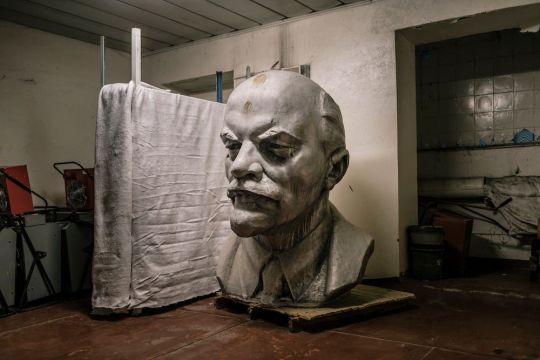
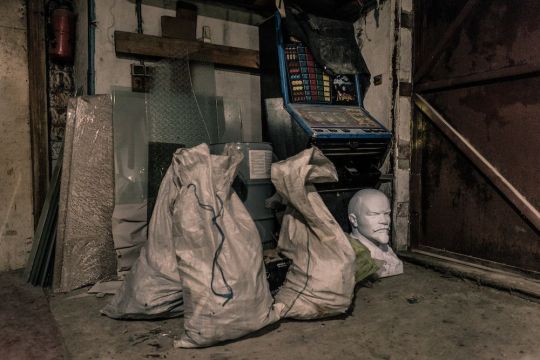
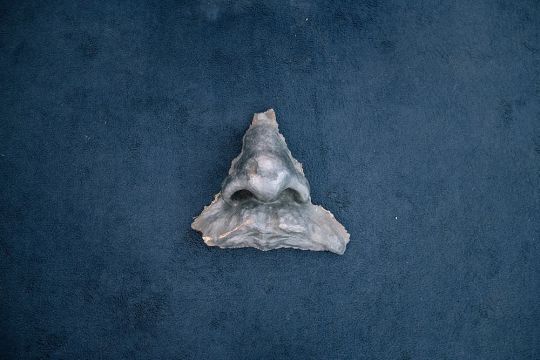
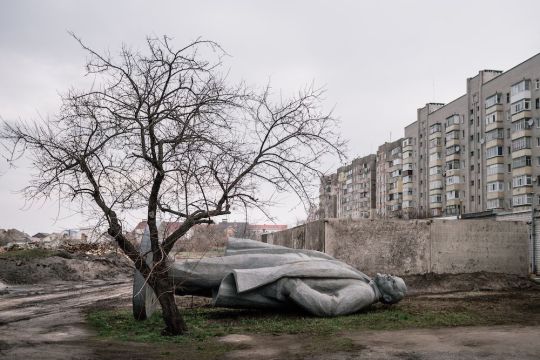
LOOKING FOR LENIN a project by Niels Ackermann & Sebastien Gobert
https://www.nack.ch/lost-in-decommunisation-lenin-ukraine
https://edition.cnn.com/style/article/lenin-statues-niels-ackermann-sebastien-gobert/index.html
0 notes